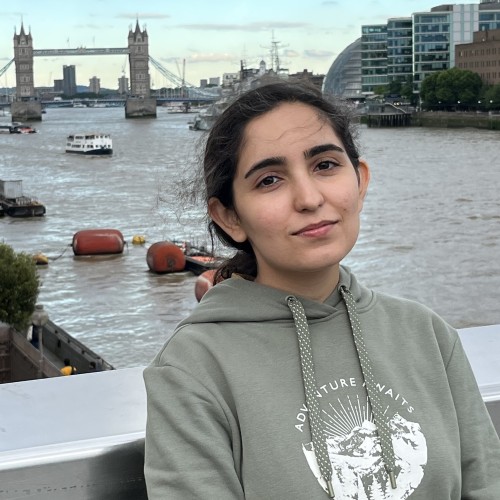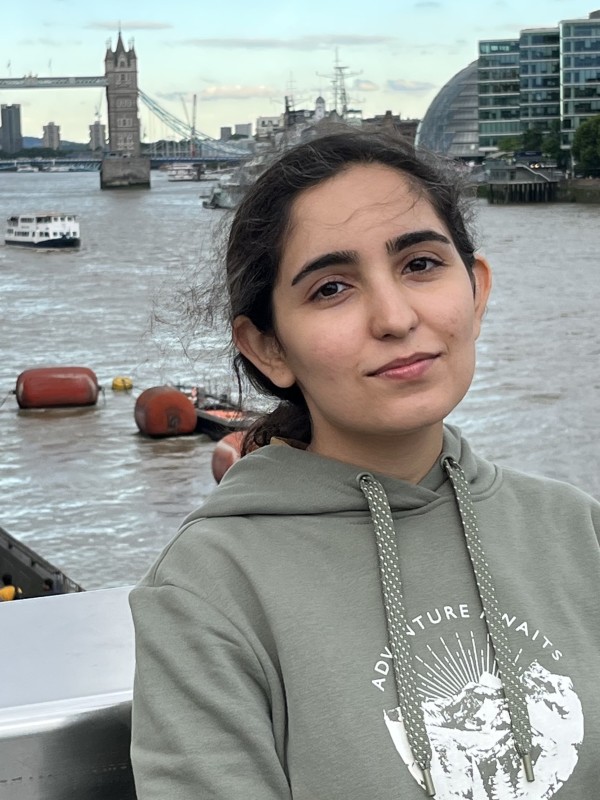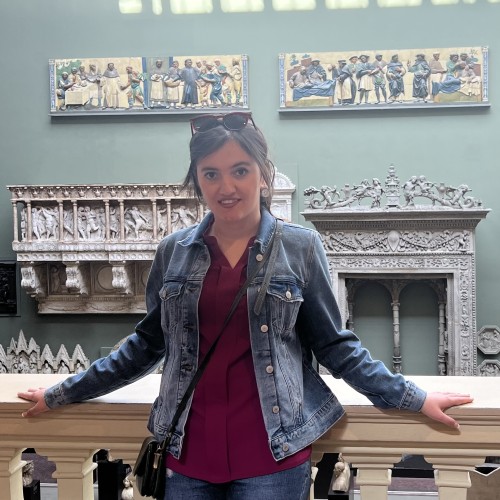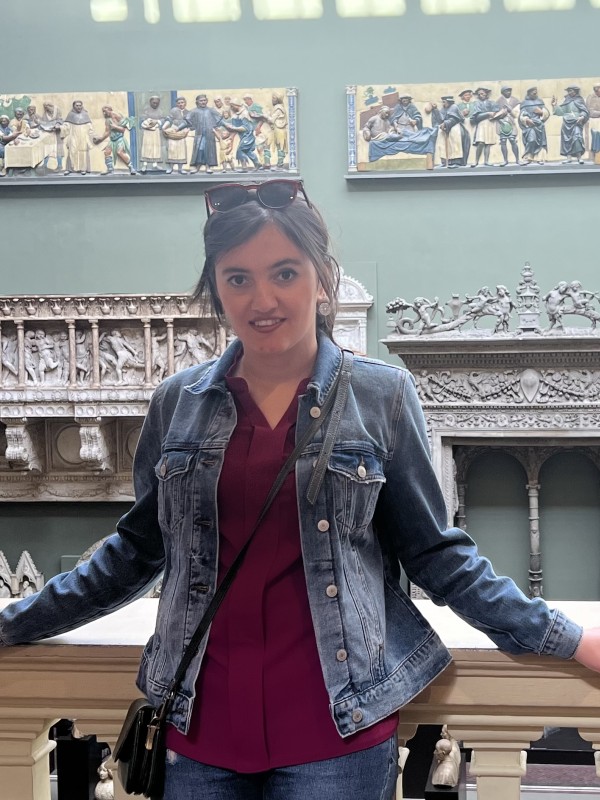
- Information and Communication Systems
PhD Information and Communication Systems
The University of Surrey’s Institute for Communication Systems (ICS), home of the 5G/6G Innovation Centre (5G/6GIC), is the one of the UK’s major academic research centres specialising in information and communications technology.
Why choose this
programme?
You’ll be taught by leading experts in the field, become part of our thriving community of academics, researchers and PhD students, and gain excellent employment prospects.
We’re specialists in mobile and wireless technologies, including satellite communications and networks, internet of things, cyber security, and future network architectures and protocols. As home to the 5G/6GIC, we’re recognised as world leaders in end-to-end research and practical implementation for 5G/6G mobile communications and beyond.
Our strong track record in research includes high-quality publications, patents and world-class implementations. We’re heavily involved in collaborative research across the UK, Europe, Asia and the Americas, funded by governments and industry. Our PhD graduates secure good positions across industry and academia in the UK and worldwide.
We are ranked in the top 50 for telecommunication engineering in the Shanghai Global Subject Rankings 2024.
What you will study
It normally takes three to four years of full-time study to complete this PhD. Your research can be based on a topic of your choice, or may be dictated by industry sponsorship or government funding.
You’ll be assigned two supervisors, who’ll guide you through your studies. Your supervisors will give you direction and experience of the cutting-edge technologies in their areas of expertise. They’ll also give you the support you need to complete your PhD, from giving you guidance and feedback on your work to helping you frame your research proposal. Though you’ll primarily be in contact with your two supervisors, you’ll also work with other staff within ICS and you may have the opportunity to become a team member on research projects.
Assessment
You’ll be required to write a confirmation report on your research in your first year, and you will be examined by two examiners.
Your final assessment will be based on the presentation of your research in a written thesis, which will be discussed in a viva examination with at least two examiners. You have the option of preparing your thesis as a monograph (one large volume in chapter form) or in publication format (including chapters written for publication), subject to the approval of your supervisors.
Location
This course is based at Stag Hill campus. Stag Hill is the University's main campus and where the majority of our courses are taught.
Research themes
We research areas related to information and communication technology, including end-to-end terrestrial, mobile and satellite communications and networks, and their application to verticals such as connected vehicles and health, including:
- 5G-Advanced and 6G
- Integrated satellite and terrestrial 5G and 6G
- Artificial intelligence networking and wireless communications
- Reflective and transmissive intelligent surfaces
- THz communications and components
- Positioning and image sensing
- High-quality time and frequency transmission
- Teleportation
- Connected transportation
- Ultra-Massive MIMO
- Terabits-per-second communications
- Internet of senses
- Network and physical layer security
- Intelligent and high-performance networking and service delivery
- MAC, RRM and RAN management
- Theory and practice of advanced concepts in wireless communications
- Antennas and signal processing.
Research centres and groups
See a full list of all our academic staff within the Institute for Communication Systems.
Research support
The professional development of postgraduate researchers is supported by the Doctoral College, which provides training in essential skills through its Researcher Development Programme of workshops, mentoring and coaching. A dedicated postgraduate careers and employability team will help you prepare for a successful career after the completion of your PhD.
Facilities
You’ll be allocated space in ICS, which is home to 143 researchers. ICS is one of the world’s major academic research centres dedicated to mobile and wireless communications. You’ll have access to state-of-the-art facilities such as:
- Campus-wide 5G/6G testbed
- Antennas and signal processing
- Networks lab testbed
- Link and system level simulators
- Satellite networking testbed
- Security testbed
- Wireless network testbed
- Internet of things testbed.


Melika Emami
Student - Information and Communication Systems PhD
"Having an experienced supervisor in my research area has been invaluable to me throughout my PhD journey... their unwavering support and encouragement have significantly boosted my self-confidence, especially in times when I needed it the most."


Zohre
Student - Information and Communication Systems PhD
'I wanted to learn more about telecommunications and find solutions to improve connectivity for people and businesses. Working towards a PhD allowed me to pursue this goal through research.'
UK qualifications
Applicants are expected to hold a first or upper second-class (2:1) UK degree in a relevant discipline (or equivalent overseas qualification), or a lower-second (2:2) UK degree plus a good UK masters degree - distinction normally required (or equivalent overseas qualification).
English language requirements
IELTS Academic: 6.5 or above (or equivalent) with 6.0 in each individual category.
These are the English language qualifications and levels that we can accept.
If you do not currently meet the level required for your programme, we offer intensive pre-sessional English language courses, designed to take you to the level of English ability and skill required for your studies here.
Selection process
Selection is based on applicants:
- Meeting the expected entry requirements
- Being shortlisted through the application screening process
- Completing a successful interview
- Providing suitable references.
Fees per year
Explore UKCISA's website for more information if you are unsure whether you are a UK or overseas student. View the list of fees for all postgraduate research courses.
* Please note: any start date other than September will attract a pro-rata fee for that year of entry (75 per cent for January, 50 per cent for April and 25 per cent for July).
October 2025 - Full-time
- UK
- £5,006
- Overseas
- £27,200
October 2025 - Part-time
- UK
- £2,503
- Overseas
- £13,600
July 2025 - Full-time
- UK
- £1,197
- Overseas
- £6,550
July 2025 - Part-time
- UK
- £598
- Overseas
- £3,275
January 2026 - Full-time
- UK
- £3,755
- Overseas
- £20,400
January 2026 - Part-time
- UK
- £1,877
- Overseas
- £10,200
April 2026 - Full-time
- UK
- £2,503
- Overseas
- £13,600
April 2026 - Part-time
- UK
- £1,252
- Overseas
- £6,800
- Annual fees will increase by 4% for each year of study, rounded up to the nearest £100 (subject to legal requirements).
Additional costs
There are additional costs that you can expect to incur when studying at Surrey.
Funding
A Postgraduate Doctoral Loan can help with course fees and living costs while you study a postgraduate doctoral course.
Application process
Applicants are advised to contact potential supervisors before they submit an application via the website. Please refer to section two of our application guidance.
After registration
Students are initially registered for a PhD with probationary status and, subject to satisfactory progress, subsequently confirmed as having PhD status.
About the University of Surrey
Need more information?
Contact our Admissions team or talk to a current University of Surrey student online.
Code of practice for research degrees
Surrey’s postgraduate research code of practice sets out the University's policy and procedural framework relating to research degrees. The code defines a set of standard procedures and specific responsibilities covering the academic supervision, administration and assessment of research degrees for all faculties within the University.
Download the code of practice for research degrees (PDF).
Terms and conditions
When you accept an offer to study at the University of Surrey, you are agreeing to follow our policies and procedures, student regulations, and terms and conditions.
We provide these terms and conditions in two stages:
- First when we make an offer.
- Second when students accept their offer and register to study with us (registration terms and conditions will vary depending on your course and academic year).
View our generic registration terms and conditions (PDF) for the 2024/25 academic year, as a guide on what to expect.
Disclaimer
This online prospectus has been published in advance of the academic year to which it applies.
Whilst we have done everything possible to ensure this information is accurate, some changes may happen between publishing and the start of the course.
It is important to check this website for any updates before you apply for a course with us. Read our full disclaimer.

